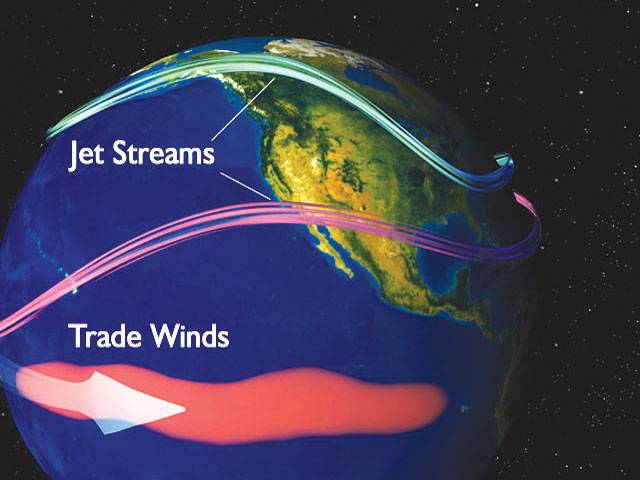GENEVA-The UN weather agency Tuesday warned there was a good chance of an ‘El Nino’ climate phenomenon in the Pacific Ocean this year, bringing droughts and heavy rainfall to the rest of the world.
The World Meteorological Organisation (WMO) said its modelling suggested a ‘fairly large potential for an El Nino, most likely by the end of the second quarter of 2014.’ ‘If an El Nino event develops ... it will influence temperatures and precipitation and contribute to droughts or heavy rainfall in different regions of the world,’ WMO chief Michel Jarraud said in a statement.
The El Nino phenomenon occurs every two to seven years, when the prevailing trade winds that circulate surface water in the tropical Pacific start to weaken. WMO pointed out Tuesday that since February, trade winds had weakened and there had been a sig0nificant warming of the waters below the surface in the central Pacific. ‘While there is no guarantee this situation will lead to an El Nino event, the longer the trade winds remain weakened, and sub-surface temperatures stay significantly warmer than average, the higher the likelihood,’ it said.
Two thirds of climate models predicted that the phenomenon would begin sometime between June and August, with a few suggesting it could start as early as May, and the remainder predicting no El Nino this year, it said. The last El Nino occurred between June 2009 and May 2010. It is often followed by a return swing of the pendulum with La Nina, which is characterised by unusually cool ocean surface temperatures in the central and eastern tropical Pacific.
Scientists, who closely monitor the two climate patterns, say that while they are not caused by climate change, rising ocean temperatures caused by global warming may affect their intensity and frequency. ‘El Nino has an important warming effect on global average temperatures,’ Jarraud cautioned, stressing that combined with human-induced warming from greenhouse gases such events had ‘the potential to cause a dramatic rise in global mean temperature.’
Friday, April 19, 2024
UN weather agency warns of ‘El Nino’ this year

Caption: UN weather agency warns of ‘El Nino’ this year
Minister reviews naan, roti prices
April 19, 2024
ETPB land worth Rs 40b retrieved so far
April 19, 2024
Lahore revamping plan to complete by June 30
April 19, 2024
CCPO reviews security for by-elections, NZ cricket matches
April 19, 2024
A Tense Neighbourhood
April 19, 2024
Dubai Underwater
April 19, 2024
X Debate Continues
April 19, 2024
Hepatitis Challenge
April 18, 2024
IMF Predictions
April 18, 2024
Kite tragedy
April 19, 2024
Discipline dilemma
April 19, 2024
Urgent plea
April 19, 2024
Justice denied
April 18, 2024
AI dilemmas unveiled
April 18, 2024
ePaper - Nawaiwaqt
Advertisement
Nawaiwaqt Group | Copyright © 2024





